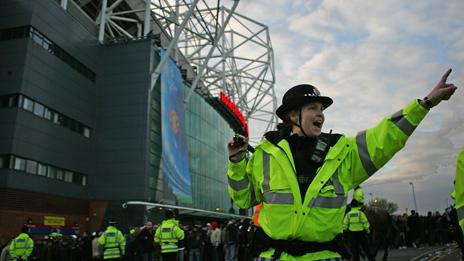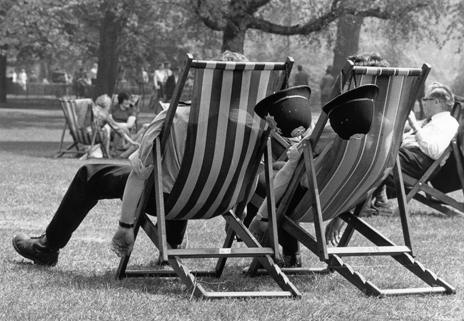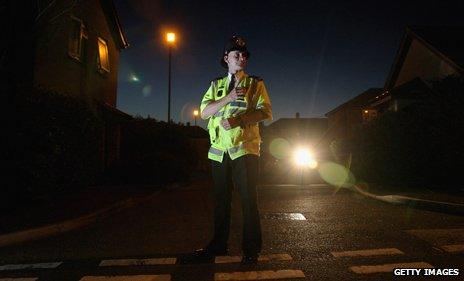What do bobbies learn on the beat?
- Published
- comments

Every police chief in Britain started out as a humble beat officer. Why are proposals to scrap that tradition in England and Wales causing such anger?
For those unfamiliar with the culture and traditions of British policing, and the almost mythic status of the "bobby on the beat," it sounds like a very modest reform.
Her Majesty's Inspector of Constabulary Tom Winsor believes the only way to make policing a more attractive career to students at top universities is to recruit about 80 "direct entry" graduates a year into the rank of inspector.
In the shorter term, he wants to poach "exceptional individuals" from "the military, the security services, industry, commerce and the professions" and train them to become superintendents, a higher rank than inspector, within 15 months. It typically takes a newly recruited constable up to 25 years to reach that level.
He also wants chief officers from overseas to be eligible for equivalent roles in England and Wales.
The move could see officers becoming chief constables in their 30s, instead of in their 40s. Police Minister Damian Green has launched a consultation on the proposals, which will run until March, with an announcement on possible legislation to follow in the summer.
But for police union leaders - already at war with the government over cuts to pay, pensions and staff and elected crime commissioners - this apparently innocuous plan, details of which were confirmed on Wednesday, strikes at the very core of what it means to be a police officer in England and Wales.
"Do you have to have been a shelf-stacker to be the chairman of Marks and Spencer? Absolutely not," says Police Federation vice-chairman Steve White.
"But the police service is unique. It is a unique set of skills. We feel very strongly that you have to have that grounding."
Breaking up fights in city centres on a Saturday night, turning up alone to violent "domestics", delivering the bad news to relatives of murder victims - these kind of experiences shape a young officer's character and ability to lead, he argues.
"Sometimes you have got to be able to make decisions instantly. It is not like working in a bank, where you can sit and ponder stuff.
"Police officers have a sixth sense which is built up over time. It is like the X Factor."
Without that X Factor, you risk turning officers into out-of-touch, over-educated technocrats that no longer have anything in common with the people they are policing, he claims.

"If we are not careful we are going to end up with a paramilitary-style organisation - the only time you will see the police is when they are arresting you or dealing with a riot."
Several police forces, including Britain's largest, the Metropolitan Police, already have graduate recruitment schemes. They all insist that recruits spend time on the beat.
But Tom Winsor wants to dispense with that stage for graduates from top universities to make a police career a more attractive alternative to the City or the professions.
As Winsor himself points out, in a 1,000-page report published last year, this goes against one of the founding principles of policing in Britain.
When the Metropolitan Police was created in 1829, it had to reassure the public it was not a standing army - and so sought to recruit men from the labouring classes rather than the middle and upper tiers of society.
The Met's founders wanted to create a democratic body that was "in tune with the people" and so deliberately avoided the two-tier system of recruitment that existed in the army.
Instead, they recruited men who were literate but "who had not the rank, habits or station of gentlemen".
The spiritual heirs of these early recruits could be seen last year sporting "PC Pleb and proud" T-shirts as they protested against the alleged class-based slurs of government chief whip - and former army officer - Andrew Mitchell. Mitchell strenuously denies using the word "pleb".
Winsor, a former rail regulator, argues that far from keeping the police in touch with the public they serve, this deeply ingrained "blue collar" attitude is out-of-step with the modern world and is holding police officers back.
In an era of cybercrime and complex fraud, a higher calibre of recruit is needed, he argues in his report.
"Policing today is entirely different, and yet so much of its ethos is of the past. The attitudes of some police officers today remain fastened in that mindset."
He wants to raise the pass mark on the police entrance exam, introduce annual testing and a requirement that all new recruits have three A-levels.
"For too long, the police service has recruited the great majority of its officers from too narrow a stratum of society, and formal intellectual attainment has played too little a part in recruitment," he says.
Winsor, who declined to be interviewed for this piece, has faced a fierce backlash from the Police Federation over the fact that he is the first HM Inspector of Constabulary not to have been a serving police officer.
"He hasn't spent a single day in uniform anywhere. We think from a respect perspective that puts him at a major disadvantage," says Steve White.

Taking a load off while on beat patrol in the heatwave of 1976
Any officer brought in at the rank of inspector, without serving their time as a bobby, would face similar hostility from some officers, according to a 53-year-old former constable from Merseyside, who did not want to be named.
"There would be some resentment," he says, adding that he has seen many "buffoons" promoted just because they are "good at exams". He suggests that officers with academic qualifications can sometimes "rub members of the public up the wrong way".
Other rank-and-file officers say they would have no problem working for business executives with no policing experience, as there is a need for better quality management.
"Somebody who works for Asda or Tesco has probably got about three or four thousand people working under them, which is about the same as a chief superintendent. I don't see the difference," says a 39-year-old constable, who works in a large city on the south coast of England.
He admits he would not have got into the police today, as he does not have A-Levels, and says his graduate colleagues find the multiple choice sergeant's exam "laughably easy".
Police Minister Damian Green will unveil plans to "open up the police to a wider pool of talent" at the same time as nurturing internal talent through the College of Policing.

If Winsor's proposals are accepted in full, it will no doubt spark a furious backlash from the Police Federation, already fuming about the decision to cut the starting salary for officers in England and Wales, who have come straight from school.
There is a suspicion among some rank-and-file officers that Winsor wants to use these reforms to make it easier push through other, even more controversial, changes.
"Breaking down resistance to change in an organisation with a strong internal culture often requires an injection of influence from outsiders. Looking at our current senior police leadership, I sympathise hugely with Winsor's desire to replace them as soon as possible," says Inspector Gadget, external, a serving police officer who writes an anonymous blog.
"The only thing which worries me is would senior people from elsewhere be any better?"
You can follow the Magazine on Twitter, external and on Facebook, external
- Published19 September 2012